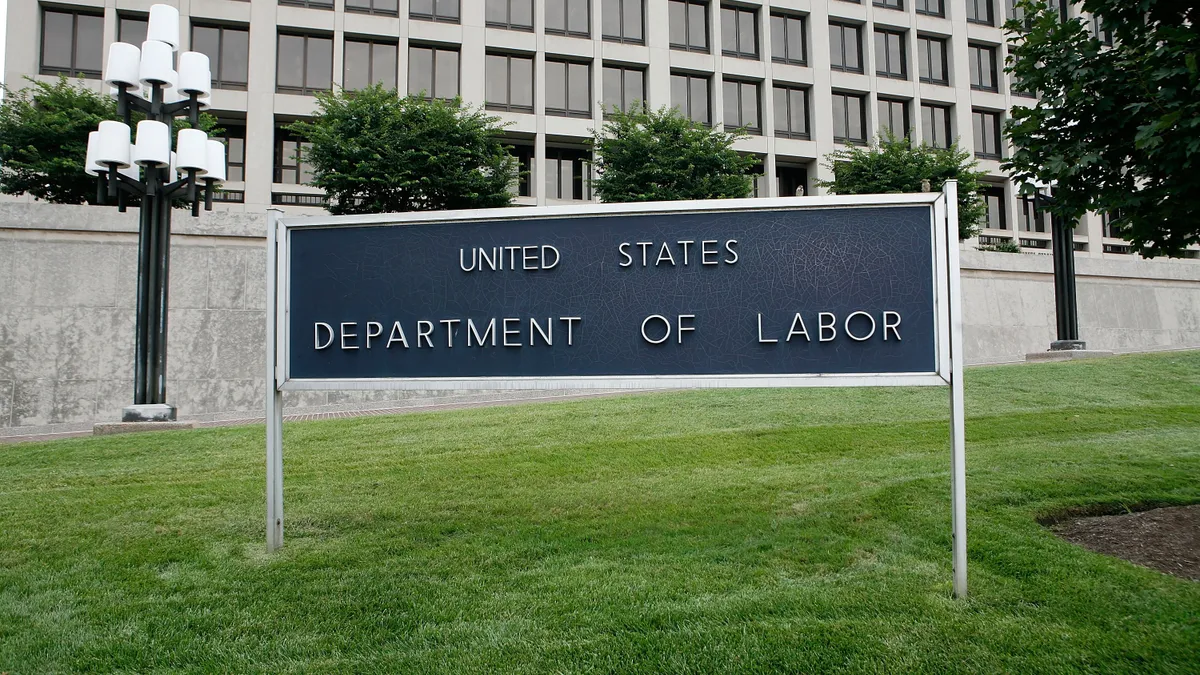Dive Brief:
- An insurance industry group and several insurers filed a lawsuit May 2 challenging the U.S. Department of Labor’s new fiduciary rule, alleging it is “contrary to law and arbitrary and capricious.” The plaintiffs are seeking a permanent injunction to stop the rule from going into effect Sept. 23.
- According to the plaintiffs, the rule exceeds the bounds of the Employee Retirement Income Security Act, functioning as “an assault on insurance agents selling annuities” and setting “the bar on who is a fiduciary so low that it would be satisfied in any transaction in which an investor accepts a salesperson’s recommendation of a particular investment.”
- The final rule, promulgated April 25, updates the definition of investment advice fiduciary and prohibits certain transaction exemptions. The purpose is to protect those saving for retirement, Acting Secretary Julie Su said in a statement.
Dive Insight:
In making its argument, the Federation of Americans for Consumer Choice, Inc., an insurance industry group, and its co-plaintiffs harkened back to a previous attempt by the DOL to expand the definition of a fiduciary under ERISA.
In April 2016, the DOL promulgated a similar fiduciary rule. Three separate groups of plaintiffs — including one led by the Chamber of Commerce — filed lawsuits challenging the rule, which made their way to the 5th U.S. Circuit Court of Appeals.
The 5th Circuit considered a consolidated lawsuit and sided with the plaintiffs, vacating the rule.
“Where the text and structure of a statute unambiguously foreclose an agency’s statutory interpretation, the intent of Congress is clear, and ‘that is the end of the matter; for the court, as well as the agency, must give effect to the unambiguously expressed intent of Congress,’” the 5th Circuit wrote, citing Chevron U.S.A., Inc. v. National Resources Defense Council Inc.
“We conclude that DOL’s interpretation of an ‘investment advice fiduciary’ relies too narrowly on a purely semantic construction of one isolated provision and wrongly presupposes that the provision is inherently ambiguous,” the court found.
In its May 2 complaint, FACC and its co-plaintiffs called the new definition of investment advice fiduciary “virtually indistinguishable” from that established by the 2016 rule that was struck down.
“The DOL refuses in this relentless policy driven quest to be constrained by ERISA and clear-cut decisions by the courts,” the plaintiffs wrote.
The FACC lawsuit is the latest in a series of legal challenges President Joe Biden’s agencies are facing this spring. In April alone, the Chamber of Commerce sued the Federal Trade Commission over its ban on noncompete agreements; employer groups led by the Coalition for Workforce Innovation sued to block DOL’s already-in-effect independent contractor final rule; and 17 states sued the U.S. Equal Employment Opportunity Commission over its inclusion of abortion accommodations in its final rule implementing the Pregnant Workers Fairness Act.
The flurry of activity is likely an attempt by agencies to complete their rulemaking before the Congressional Review Act’s deadline, expected later this month or in June. Rules received after that deadline may be subject to review and dismissal by the next session of Congress — a move that would likely be supported by a Republican president.
Biden has already vetoed a congressional attempt to overturn the DOL’s joint employer rule, a bill the legislature passed shortly after a Texas district court judge vacated the rule.














